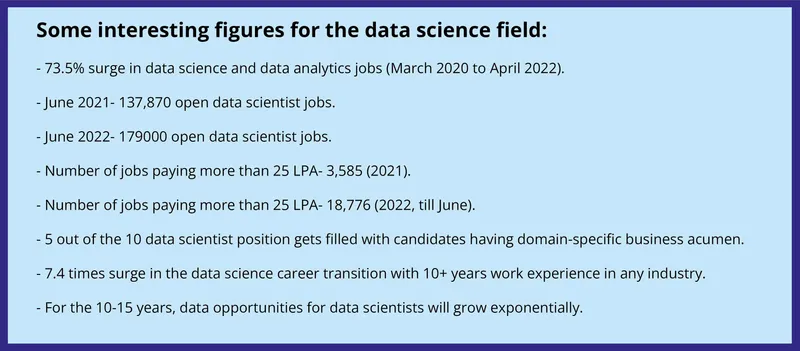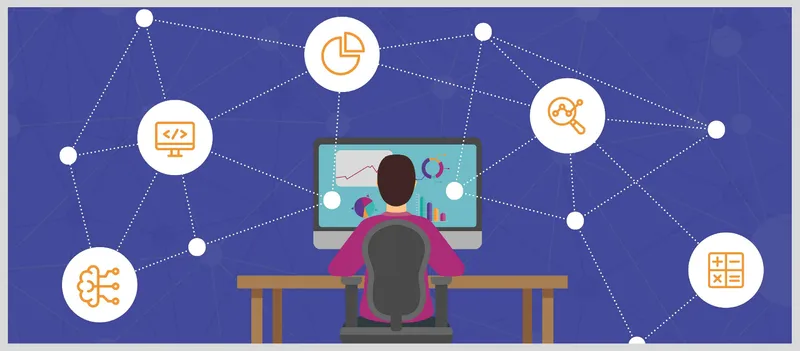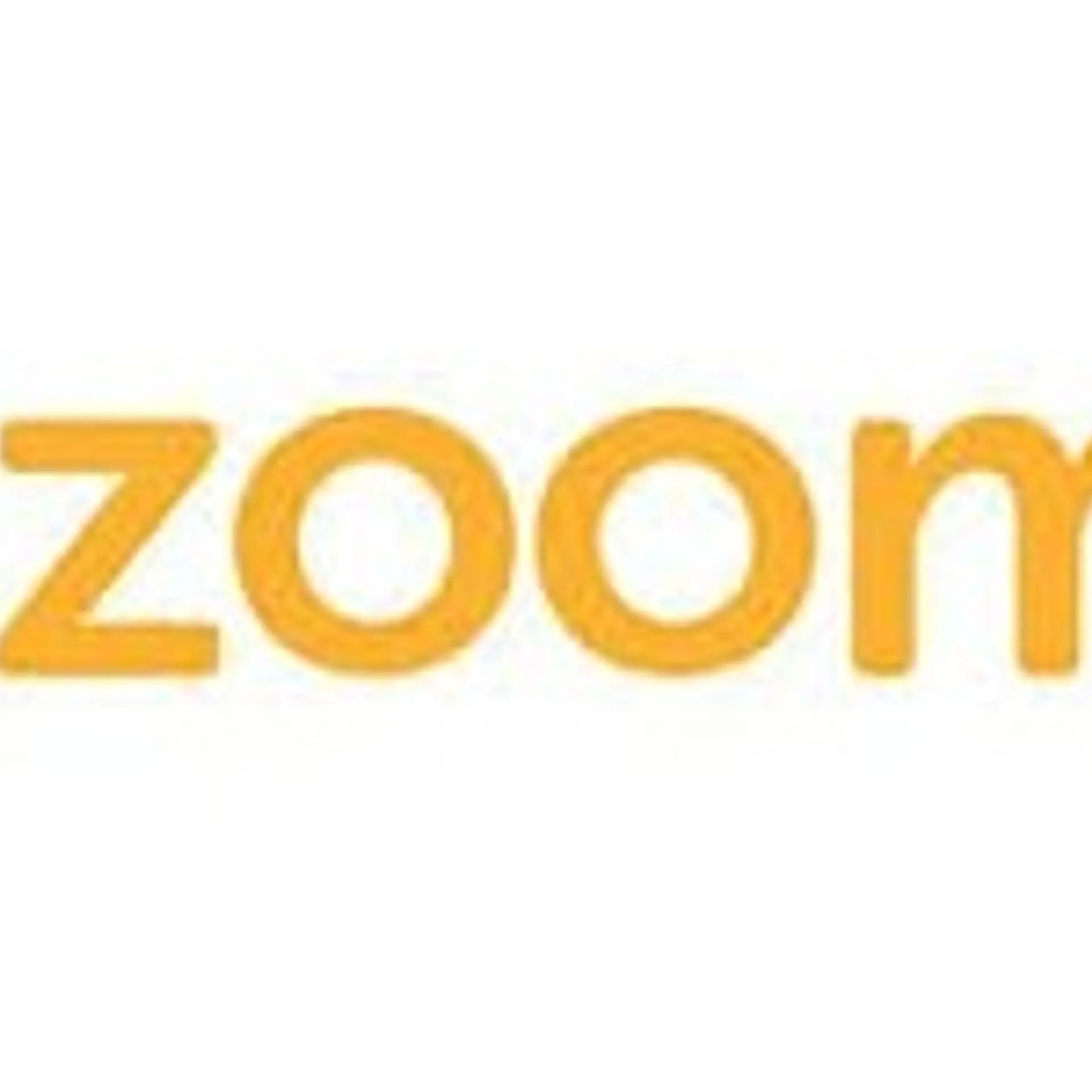

5 Elementary Skills To Become A Successful Data Scientist
Programming and Statistics are not the answer here. These five skills are enough to approach the world of data science and be a successful data scientist. Know what they are?
'Data Science jobs,' 'data science courses,' 'data scientist masters programs,' 'data scientist certification,' data scientist pay, bla bla bla..data science is reverberating everywhere. It has already been declared the 'hottest job of the 21st century.'
Our world is becoming entirely data-driven. Everything is becoming more dependent on data analytics (the basics of data science, from our health maintenance activities to the product/ service purchase decision. As a result, the need for data scientists skills has skyrocketed. Accordingly, the job opportunities and salary trends in this field are showing a steep hike every year.

The numbers are impressive, right? But 6 out of 10 candidates lack confidence in switching to data science.
Indeed, I am confident that you have taken a step back from pursuing a career in data science. Especially if you are from any non-IT background, certainly it would be your scenario.
Well, one of my friends spent 5 frustrating years in the marketing industry. She has no CS or IT background. She did her bachelors in a commerce-related field from a mediocre university. Still, she's currently a successful data scientist and advancing quickly. She wasn't a coding or statistical whiz. In fact, I've seen techies struggle to become data scientists. Hence. Technical and statistical skills alone won't make a data scientist successful. Let's delve a little more into this.
The key reasons why aspirants refrain themselves from becoming a data scientists are:
- I am not well versed in stats/ or I have had never study statistics in my academics
- I am not a ninja of coding/ I have never come across even the 0-level coding.
But did you know, till now, 75% of successful data scientists are from non-stat and non-tech backgrounds?
So, what basic skills do you need to be a data scientist?
- Machine Learning
- Deep Learning
- Advanced statistics
- Artificial Intelligence
- Tableau, etc.
- Python, R
Well, these are the most circulated answer for elementary data scientist skillsets. These skills you can easily earn once you step into any professional's data science learning program. But it's certainly not the right answer. Here, I am going to offer the most appropriate but least exposed answer to the same query.

1. You should hold Endless Curiosity- Be A Critical Researcher
A Data scientist is not a simple data analytics profile, where inserting data and effectively working on advanced excel will determine output. Even it's not like the job profiles with targets, where you have to achieve few numbers within a given span of time. Rather, it's more like a researcher profile who have to take business decisions too.
Yes, to be a successful data scientist, first, you need to be a researcher. You must have endless curiosity about all kinds of possibilities associated with data. The greatest data Scientists are always crazily out-of-the-box thinkers. They have the ability to foresee even the undiscovered possibilities in a dataset.
And yes, you must hold the guts of doing research.. research… and more research, followed by critical thinking. No matter whether you are doing the same on the raw data or on the insights.
2. You Must Be An Excellent Storyteller
No, I am not talking about any editorial or a writer role. Still, I insist that if you want to be successful as a data scientist, hone your storytelling skills. In fact, a person with endless curiosity, the love for emerging technologies, and extraordinary storytelling abilities are born to be a great data scientist.
But why storytelling?
Well, as a data scientist, your responsibilities do not end are preparing the reports. You have to present the same in front of your target audience (which might be internal or external stakeholders). And you will be responsible for making your audience understand the profitable sites of your presented insights. The success of a project can be made or broken by the ability to tell a compelling tale that engages and drives the audience's attention towards what you want to take them.
Hence, a good storyteller is always a prospective candidate for an established data scientist career.

3. You'll Need Solid Business Acumen To Succeed As A Data Scientist
Until now, I've emphasized intellectual skills enough. Let's look at data scientists' practical skills. Data science isn't confined to the thesis; it requires every evaluation. You must know the target business domain thoroughly to turn your insight into a solution.
Just take a simple example. Suppose you are making the prediction of a possible customer base for an e-commerce product. You need an idea about the latest fashion trends and customer orientations on both prices, quality, even color, designs, etc.
Now, consider you are doing a similar project but for a financial product- e.g., 'a retirement plan scheme'. Will your customer-based knowledge of e-commerce work here??
Here, you need adequate knowledge of regional financial laws, GDPs, taxes and other charges, credit scores, interest percentages, etc.
As a data scientist, you not be limited to a countable number of datasets for analysis. Hence your domain experience should be older enough. Higher is your domain expertise; the greater will be the chances of becoming a high-paid and successful data scientist.
90% of job searchers and career advisers overlook this skill (domain knowledge). Finally, this results in a failed effort at a career transformation in data science.
But what about the programming and statistical skills? In the end, they've already been shown to be a crucial pillar in the realm of data research.
Here, let's look back. So far, I've mentioned that advanced programming and statistics aren't mandatory for data scientist success. I didn't say these talents aren't needed.
Certainly, you need these skills, but you need not be a ninja of the same. So the next two data scientist skills I am going to mention are as follows.
4. You Must Earn A Certain Level of Mathematical Understanding
Please note that I have not even used the word 'statistics' here. To start with data science, the ability to understand high school-level math is enough. Afterward, you will gradually learn the application of advanced-level math via proper training and practical applications.
Just for insane, take an example of a data science project where you are going to launch a new credit card offer scheme for customers earning more than 20LPA. You have to design a multiple-scale investment plan for such a credit card scheme. Obviously, you can't offer the same benefits to the customer communities with annual spending of 80K and the community having annual spending of 5 lakhs or more (via credit card).
So, the foremost types of mathematical calculations you need to do like
● Average
● Mean, median, mode
● Standard deviation, etc.
● Basic probabilities, etc.
Obviously, for further mathematical needs like correlational calculus, or ANOVA, you will get training while pursuing a job-ready data science course.
5. Last but not least, You Need the Ability to learn Programming
To take the first step of becoming a data scientist, you just need the ability to upskill yourself with programming knowledge. Prior programming knowledge is not at all mandatory.
In fact, it might be possible, even after already being a programming ninja, that you remain unsuccessful as a data scientist because programming knowledge is not a big deal here. Rather, you need to be the ninja of playing with your programming abilities to crunch the data for unique and profitable insights. Otherwise, with adequate interest and considerable guidance, anyone can develop coding skills at any age.
E.g., Imagine you have to find the average, minimum, and maximum of all the employee's salaries.
How do you calculate it?
Average: You will take the sum of all the salaries and then divide it by the number of employees.
Example 1: For example, as shown in the below table:


It's straightforward, right? What if you're told to obtain details on 1 million employees? Here's where it gets tricky: use programming to simplify life. The identical outcomes can be achieved with one line of code.

Example 2: You need to segregate even numbers from a list. The most frequent way is using for loop, as shown in the code below.

But, if you're strong at programming, you can do the same thing in one line of code.
List Comprehension Method

Both codes offer the same outcome, but reducing the code and receiving the outputs faster when working with large datasets is better.
Summing Up:
For data scientist success, you must comprehend the field's requirements. Remember these things. To be a demanding data scientist,
● You need not be a statistician or mathematician- a moderate level of mathematical understanding is enough.
● No need to be a developer- rather, be an expert in crunching data using basic to moderate-level coding concepts.
● No need to be an author- be that communication expert who can help each of his audience members grasp the recognized insight from their (audience) desired perspectives.
Being a successful data scientist does not mean you have to work for a FAANG/ MNC. Just be an extraordinary researcher with a critical mind, basic coding abilities, ample mathematical understanding, and unicorn storyteller. In fact, with such abilities, not only you can become a highly paid data scientist, but also you can start your own business too. You can learn and earn a huge even by doing freelancer data science projects.
I shared a data science career secret. Use it to prepare for future success.
Best of luck!





